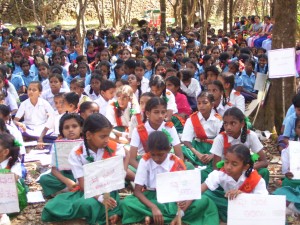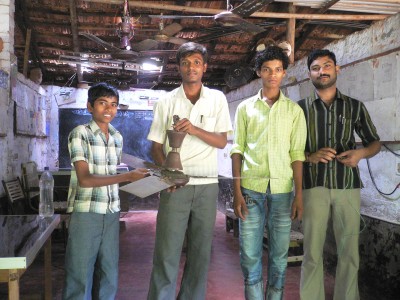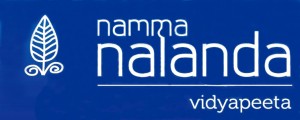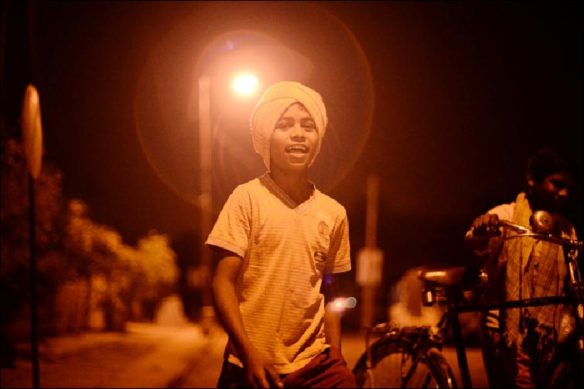Education for democracy
 “It is the quality and nature of the individuals that our education system produces, and the interrelationships they are capable of, that will determine the socio-political fabric of our nation.”
“It is the quality and nature of the individuals that our education system produces, and the interrelationships they are capable of, that will determine the socio-political fabric of our nation.”
Nandana Reddy, founder, CWC. Nandana is on the team that frames the National Education Curriculum
The Concerned for Working Children believes that everyone has the right to education regardless of cultural background and gender differences; that education must teach children not only to be workers, but to be active democratic citizens.
Through our education programme, Namma Nalanda Vidyapeetha, and through educational partnerships with schools across Karnataka, we have put these principles into practice, providing hundreds of children with flexible, child-centred education and vocational training.
Child labour: an education issue
CWC’s involvement with education stems from our roots empowering working children. Millions of school-age children across Karnataka are out of school and receiving no education. Early on in our work, children told us that they wished they could combine work with education, and CWC began providing informal after-hours education in Bangalore. Working children told us that they dropped out of school because it did not seem relevant to their lives; we established the Appropriate Education Programme to provide an education that properly equips rural children for adulthood. Our research revealed that the majority of working children in cities are migrants from rural areas; we established vocational training schemes to equip children with skills that enable them to build careers while staying at home.
Education for democracy
The role of education lies not just in disseminating knowledge, but in sculpting the fabric of a nation. It should not ignore traditional and indigenous knowledge, or constitutional principles and values.
CWC believes that while education prepares children for their lives as adults, it should also:
- enable children and adolescents to effectively address the issues they confront
- equip children with knowledge and skills to question and challenge such traditional practices that are unjust and discriminatory
- make it possible for them to understand their own lives and their world
- acquire the freedom to define their own lives, and
- give them a strong grounding in their own communities and then provide them the path to go right up to the international levels if they so desire.
Above all, we believe that education should be ‘democratic and for democracy.’ The learning environment, relationships, decisions and practices must be democratic so that each Indian child learns how to interact and form partnerships with others to preserve and enhance democracy. Our work in education has been designed to reflect these principles.
Namma Nalanda Vidyapeetha
Our education programme is based in Namma Bhoomi (‘our land’), our resource centre in Kundapur district in Western Karnataka. For children aged two to 14, we provide a programme of mainstream academic education combined with unique vocational and life skills training in line with our Appropriate Education Programme (see below). For children aged 14-18, we provide residential vocational training in a range of areas, from computing and electrics to textiles and beauty.
Namma Nalanda Vidyapeetha has been recognised by the Government of India as a Rural Extension Polytechnic, and by the National Institute Of Open Schooling, enabling children at all ages to obtain national recognized qualifications. Namma Nalanda Vidyapeetha also functions as an extension of the Manipal Institute of Technology.
In the long term, our aim is for Namma Nalanda Vidyapeetha to lead the transformation of the education system from the grassroots, with special focus on children in remote underdeveloped rural areas, especially girls, and migrant and working children, tribals and differently-abled children. Our aim is to:
- Ally with other like-minded schools and together develop an educational certification, on the lines of ISO standards, to identify ‘Quality New Age Indian Schools.’
- Support the growth of public education and help spread best practice, including the principles of AEP, to the government school system.
Vocational training: 14-18yrs
 Namma Nalanda’s vocational training offers children the chance to learn construction, carpentry, electrification, weaving, bamboo crafts, tailoring and housekeeping in an eighteen- month program. These vocations have been selected primarily because they are not exploitative, raw materials are easily available in rural areas, and finished goods are easy to sell in both rural and urban settings. Training tools, course material, and raw materials for practical learning are provided by CWC. Local artisans contribute their expertise to the teaching programme and students are able to sell their produce through our marketing collective Namma Angadi. Namma Nalanda is recongised by the Government of India as a Rural Polytechnic.
Namma Nalanda’s vocational training offers children the chance to learn construction, carpentry, electrification, weaving, bamboo crafts, tailoring and housekeeping in an eighteen- month program. These vocations have been selected primarily because they are not exploitative, raw materials are easily available in rural areas, and finished goods are easy to sell in both rural and urban settings. Training tools, course material, and raw materials for practical learning are provided by CWC. Local artisans contribute their expertise to the teaching programme and students are able to sell their produce through our marketing collective Namma Angadi. Namma Nalanda is recongised by the Government of India as a Rural Polytechnic.
Regular school: 4-14yrs
Namma Nalanda now offers a full-time school program to X Standard under CWC’s Appropriate Education Programme (see below). The AEP enables students to learn the traditional formal school curriculum and take nationally recognized qualifications endorsed by the National Institute of Open Schools. However, under the principles of the AEP, students also receive education in life skills, social issues and rights and empowerment. They can also opt to take vocational courses alongside their older counterparts (see above).
Watch “Making a Path”, a film about Vanaja, one of the students from the early years of Namma Nalanda Vidyapeetha:
Appropriate Education Programme
Of the thousands of children who drop out of school each year, only a minority leave school because financial pressures force them to work. Many more leave school simply because they are unhappy there. Children tell us that a combination of poor facilities, formal, non-child-centred teaching and an excessively academic syllabus mean that school seems to have little relevance to their lives.
To combat this, CWC developed the Appropriate Education Programme – a unique blend of formal education, rights- based education, life- skills, and vocational/ professional education. This ensures that students receive a holistic and well-rounded education.
Children under the AEP learn the standard government curriculum and can enter exams. However, they receive additional education in democracy and citizenship, social issues, child rights, sexuality, gender, health, and hygiene through interactive workshops.
AEP teaching is carried out in accordance with the principles of Montessori education. Although it is sometimes associated with the wealthy, Montessori methodology was actually developed for the education of less well-off children in Italy. With its emphasis on personal development rather than constant tests and exams, Montessori is an ideal approach to reach the thousands of children every year who drop out of the traditional schooling system.
Principles of AEP teaching
- Rather than placing students in rows facing the teacher, AEP classrooms have seating at the sides, leaving space for individual and group activities.
- Daunting textbooks are replaced with chapter booklets.
- Teachers receive 10 days of training in AEP principles and regular refresher courses.
- Local resources and community participation are considered important. Artisans such as carpenters, painters, weavers, potters and artists from the local area contribute to skills teaching.
- Material is available which children can use for self-directed learning.
AEP is the teaching approach used at Namma Nalanda Vidyapeetha. CWC has also introduced the AEP into more than 60 Panchayats across Karnataka as part of its ‘Toofan’ programme. The AEP covers all children in a project area: working children, those enrolled in schools, as well as those who are able to attend extension schools from time to time. A majority of the children work in agriculture, in the hotel industry, in cashew factories, or catch fish in rivers and coastal areas. Some collect forest produce, or engage in traditional occupations such as weaving and pottery.
School children attend centres in the normal fashion. Working children attend for a few hours before or after work, or as they are able. Although the Montessori method does not involve frequent testing, children are encouraged to sit for formally recognised examinations to gain qualifications.
The centres are also used as extension schools where working children can either start or continue with their learning. The children here are also encouraged to sit for formally recognized examinations. Material has been created and continues to be created which children can use for self learning without depending totally on the teacher, field staff or volunteer. The range of material, besides being curriculum- based, also includes health, political information, organizational issues, leadership concepts, cognitive areas, child labour issues and so on.
Read a 2006 seminar presentation about the AEP by CWC founder Damodar Acharya.
Education advocacy
In addition to pioneering the Appropriate Education Programme in schools, CWC advocates across India for democratic, child-centred education. We have contributed to most significant consultations on education policy and our senior team members are considered important experts in the field. Read more about CWC’s advocacy work in education.



